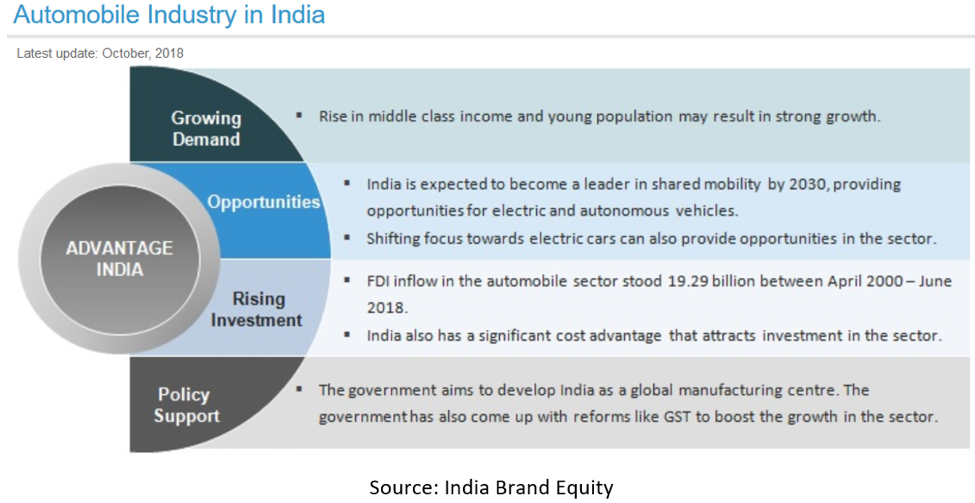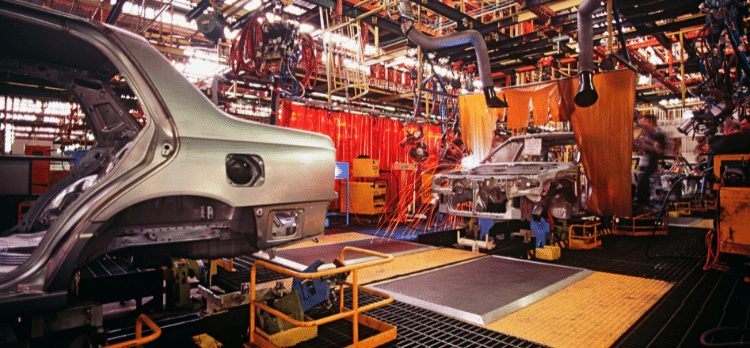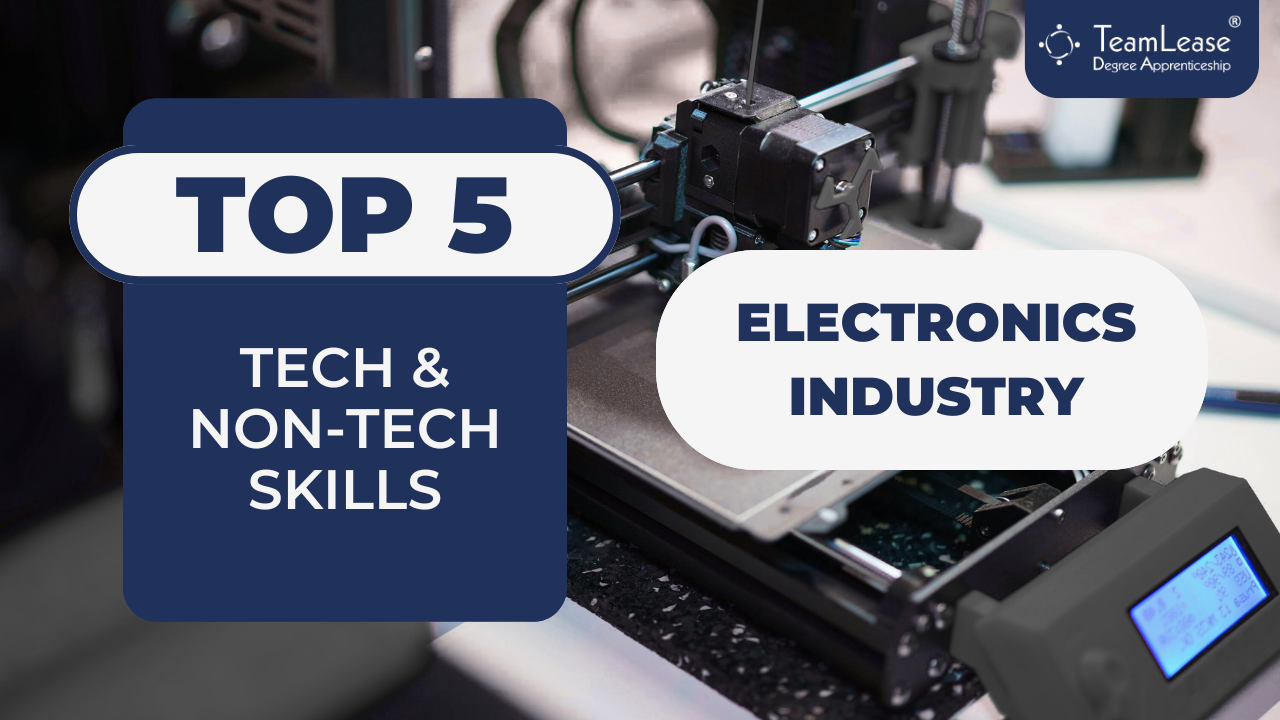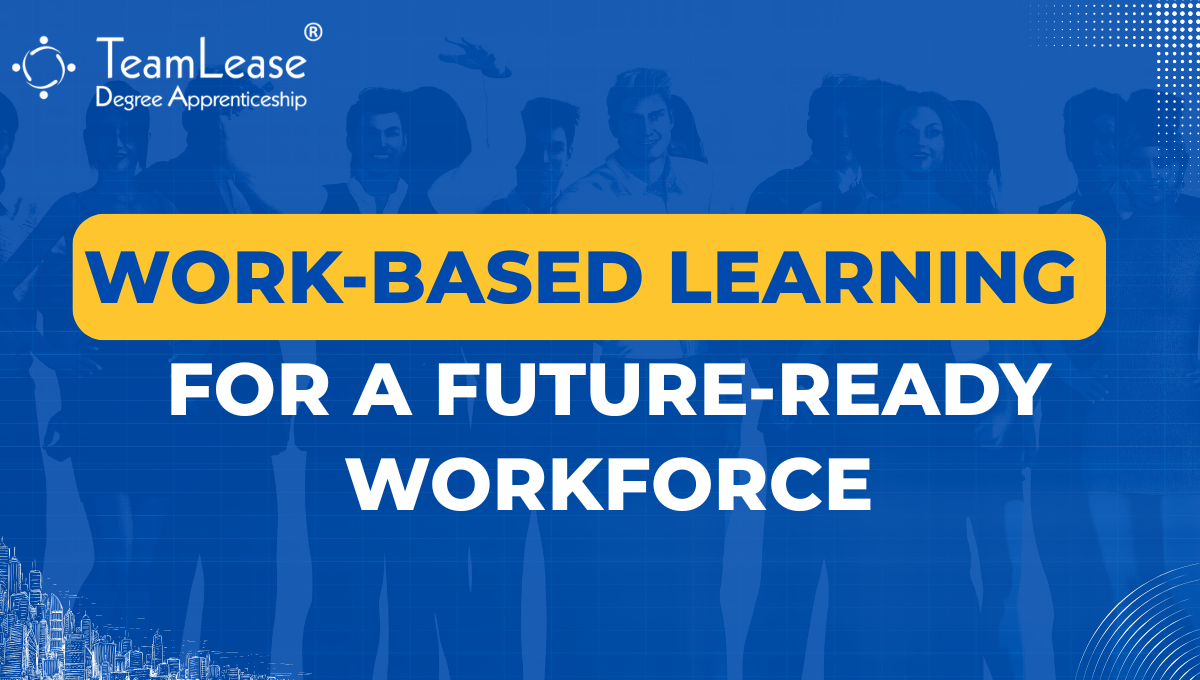Industry Snapshot
The Indian automotive industry (including component manufacturing) is projected to get to US$ 251.4-282.8 billion by 2026. The 4th largest in the world, sales in the Indian auto industry increased 9.5 per cent year-on-year to 4.02 million units (excluding two wheelers) in 2017. Domestic automobile production saw an increase of 7.08 per cent CAGR between FY13-18 where 29.07 million vehicles were manufactured in the country in 2018. April-July 2018 witnessed a production increase of 16.69 per cent year-on-year to reach 10.88 million vehicle units.[i]
Growth enablers

Manufacturing Push to Sales
According to the Automotive Component Manufacturers Association of India (ACMA), the 2018 Union Budget’s spending boost to infrastructure development, connectivity and the rural economy augurs well for the auto industry with expected increase in sales across vehicle types- commercial vehicles, entry level two-wheelers, farm-machinery and entry level cars.
Start an Apprenticeship Program without a hassle
Many in the Micro, Small & Medium Enterprise (MSME) sectors have been enthused by steps such as an increase in customs duty on imported components from the existing maximum limit of 10 percent to 15 percent, and a drop to 25 percent on corporate tax for companies with a turnover of up to Rs 250 crore. Other welcome measures include an enhanced budgetary allocation of Rs 3,794 crore as priority finance for credit support, capital and interest subsidy and a simplified process for acquiring credit via an online system for SMEs.
Dealership Landscape
There are 25,000 dealerships in India employing around 25 lakh people directly and 15 lakhs indirectly. To enable and sustain growth in the automotive sector Indian dealerships face challenges and opportunities to espouse a holistic approach for revenue growth and diversification, at the heart of which lies operational excellence driven by people capabilities.
Ashish H Kale, the newly appointed president of Federation of Automobile Dealers Associations (FADA) recently spoke about manpower being the biggest cost for dealerships- an increase of 60-120 percent depending on the region. The era of a low-cost workforce at dealerships appears to be fading as other areas of jobs growth such as e-commerce lure employees away.
A problem area is the lack of or limited skills training for professional development at dealerships leading to a high attrition rate. However, there exists a demand for a quality workforce- what with new product lines and players in the commercial vehicles space, and increased customer expectations of service levels for the passenger vehicle market. Selling a vehicle is not the end goal anymore for a business to grow. Dealerships need to build insight into a customer’s total cost of ownership and commit to training their workforce to meet new demand. This requires upskilling and re-skilling across functions such as sales, marketing, operations and customer service.
Also Read: Emerging Trends in Apprenticeship Hiring in India
Case in point- in response to a sharp decline in profitability of one of its major dealerships due to stiff competition, operational inefficiencies and low staff skills to deal with these changes, a leading Indian automobile manufacturer initiated a restructuring process of the dealership structure focusing on building capability across sales and service process staff to be future ready. The success of this initative has now been replicated across all full service dealerships for the OEM across India.
Ultimately, dealerships and automotive service centres are run by entrepreneurs for whom a capable workforce will make a big difference to their bottom line. ‘Understanding after-sales service expectations and concerns can help service dealers build a more engaging relationship with customers,’ says Kaustav Roy, Director at J D Power. ‘Doing so is not only prudent for improved customer satisfaction it can also create loyalty for the brand and lead to increased revenue streams for the dealer,’ he adds.
Customer Expectations – More Than Just Sales
What customers expect when they walk into a service centre or dealership defines the service experience. Factors such as soft skills, service initiation, accessories and customisation options, product and technical knowledge, service quality and service facility are high on the list of importance.
Customer expectation extends beyond sales- such as maintenance and related services, remote assistance, resale, automatic reminders, roadside assistance, etc.
A McKinsey article[iv] found that high performing dealerships employed formal talent management practices and provided formal training to their employees including long-term incentives to retain top talent. Conversely, low performing dealers paid less attention on recruitment and training.
Improvements in the service department such as a tour of the service facilities, building rapport with a customer by sending reminders for repeat service visits, and vehicle pick-up went a long way in building loyalty and reducing the dealer’s customer acquisition costs.
Also Checkout: Apprenticeship Outlook Report – January – June 2021
Talent Management is Key
High value skills at a dealership are sales including after sales service, product knowledge, inventory management, financing and insurance knowledge, customer service, accounting, industry software skills, service advisory and service managerial skills.
Also, the capabilities of service and repair technicians form a crucial part of a dealership. Not only must they have a basic understanding of vehicle repair & maintenance but of increasing complex vehicle technology and diagnostic equipment. Technicians are integral to customer satisfaction through the quality of their workmanship.
How to hire apprentices the easy way
Training comes in different forms, and apprenticeships are a key component given their highly specialised approach.
Find placements for your apprenticeship students faster
Industry Training & Apprenticeships
Rohit Suri, president and MD, Jaguar Land Rover (JLR) India, feels training of personnel to the highest standards and superior after-sales service is core to their company’s efforts in India. For the third year in a row, JLR India won the Jaguar Land Rover Everyday Legend Global Technician and Apprentice Technician Award of the Year 2018 at a ceremony held in the UK. Sajeesh Kumar Palat, an employee at JLR’s retailer in Kochi, Muthoot Motors won the “Global Technician of the Year 2018” award. He was judged on five different parameters – powertrain, electrical, procedure, chassis and knowledge. The contest was between 26 countries and approximately 16, 000 service technicians drawn from JLR’s global retailer network.
Toyota Kirloskar Motor (TKM) recently inaugurated the Toyota Centre of Excellence at the Global Academy of Technology in Bangalore, its third in Karnataka. To provide hand-on skills training to engineering students, TKM provides engine kits to augment practical knowledge and boost their employability skills. For instance, the engine assembly kit provides real orientation in dismantling and re-assembling techniques leading to high quality skill sets in engine operating mechanism.
Naveen Soni, Vice-President TKM believes such partnerships with colleges and institutes in the country are vital to skill building at the classroom level to develop a highly skilled workforce to match with evolving skill demands of the automotive industry.
The first batch of 215 students who received a two-year Craftsmen Training in trades such as Automotive Service & Repair, offered by Maruti Suzuki India were felicitated in September 2017. This is part of an MoU between Maruti Suzuki and Directorate General of Training to impart skills training to 10th and 12th pass youth.
The customised training curriculum– 80 per cent practical and 20 per cent theory imparts skills to students to be future employed as workshop mechanics, sales representatives or become entrepreneurs.
The training is imparted through a learn and earn model, with the company bearing all training costs. As of September 2017, 2,000 students were enrolled in these two-year training courses at the Maruti Suzuki Training Academy.
Other initiatives[v]:
- Toyota Technical Education Program provides technical training to ITI students through on-the-job experience at Toyota dealerships.
- Toyota Tantrajna, is a comprehensive apprenticeship-like blended training module of 13.5 months consisting of basic, on-the-job and classroom training. Toyota provides a stipend and other incentives for trainees during the training period.
- The Toyota Apprentice Scheme has trained over 12,000 apprentices since 2002.
Also Read: Apprenticeship Stipend Primer – the post-pandemic special
Future Focus
On an average, a car buyer devotes 60 percent of their time researching online. A third of customers will consider buying a car online. Dealership services will need to adapt and develop online and mobile-based marketing, sales and customer service practices to reach their customers. Training and apprenticeships in automotive servicing need to adapt and include such lines of demand in skills alongside the more traditional skills as outlined in the industry examples above.
References
[i] India Brand Equity– Automotive Sector- accessed Dec 1st 2018.
[ii] Ashish H Kale: ‘There will be consolidation of dealerships’, Oct 9 2018, Auto Car Professional
[iii] Dealer Effectiveness : Breaking the growth ceiling for automotive dealerships- Shripad Ranade and Anirban Majumdar of Tata Strategic Management Group
[iv] How to build top-performing auto dealerships- Carlos F. Caicedo, Mark D. Mitchke, and Jon Vander Ark, McKinsey
v Toyota Technical Training Institute (TTTI) celebrates graduation of its world-class skill talents, Aug 2018




Originally published on India Apprenticeship Forum. Reproduced with permission.
Your Comment